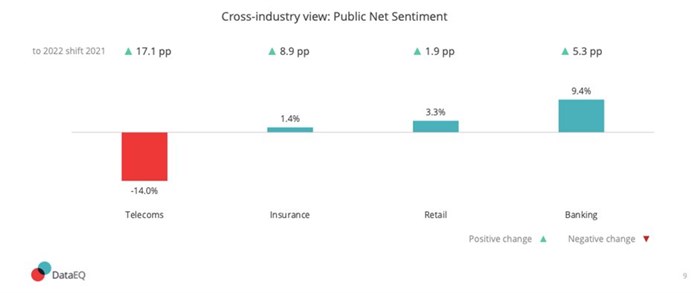Telecoms industry ranks last for consumer sentiment for 3rd consecutive year

This is reflected in data from the latest South African Telecommunications Sentiment Index conducted by PwC South Africa in collaboration with DataEQ. It reveals that the telecoms industry ranked last in terms of consumer sentiment for the third consecutive year when compared to the banking, insurance, and food retail industries.
The South African Telecommunications Sentiment Index is compiled from social media data and reflects the net sentiment of local consumers toward their telecommunications service providers. The index includes data and analysis for MTN SA, Vodacom SA, Telkom, rain and Cell C.

MTN holds onto the first-place ranking
While all five telcos included in the index scored negatively overall, MTN obtained the highest Net Sentiment of -5.2%, largely due to positivity driven by brand campaigns. Despite a small improvement from last year, MTN’s Net Sentiment lead narrowed.
Vodacom stands strong during load shedding
Load shedding continued to cause havoc with signal reliability, but Vodacom stood out for receiving the lowest proportion of complaints and even some praise around their uninterrupted coverage. This indicates that Vodacom’s investment in backup batteries is yielding positive outcomes for customers.
From telco to tech-co
Looking at the industry as a whole, Elmo Hildebrand, PwC Africa Telecommunications, media and technology leader, says that South African telecoms providers are transforming their business models, looking to use their scale and customer relationships to diversify into a range of digital lifestyle services.
“Financial services like insurance, lending and payments are already contributing to the telcos’ revenues, and with possible regulatory changes on the horizon, there is a significant opportunity for telcos to grow in this area.
“As these companies look to continue expanding into financial services, they recognise the need to become a more digital and technology-focused company that offers a wider range of value-added services beyond just traditional communication services.
“While telco business models are changing rapidly, customers still expect the basics to be done consistently and to a high standard, and the data shows us that telcos are falling short in this respect compared to banks and insurers.”
Putting the customer first
One such business basic is customer service, which accounted for 43.7% of telcos’ industry conversation — the vast majority (95.1%) of which was negative. In analysing these conversations, staff behaviour came through as a strong theme in customer service complaints, along with issues around unresponsiveness and a lack of feedback.
As seen in previous years, a large percentage (65.4%) of these complaints originate from engagements that customers have with the call centres, emphasising the importance of having competent and well-resourced support teams. This suggests that, despite the growing availability of digital channels, telecoms customers continue to rely heavily on telephonic support, often with disappointing results.
51.1% of actionable conversation goes unanswered
Unfortunately, data shows that reaching out to telcos on social media is likely to only compound consumers’ frustrations, with response rates to priority conversations sitting at 48.9%. Priority conversations refer to customer interactions or queries that relate to: reputational or operational risk (risk); acquisition opportunities (purchase); retention improvement or churn risk reduction (cancel); and customer service feedback and requests (service).
“The fact that telcos are letting half of this actionable conversation go unanswered is a clear sign that there needs to be greater integration between social customer service teams and broader support teams within the businesses,” says DataEQ telecoms lead, Liska Kloppers.
Echoing Klopper’s sentiment, Riaan Singh, PwC South Africa experience consulting lead, urges telcos to take the necessary steps in addressing customer service inefficiencies.
“In order to compete with banks and successfully make the shift from telco to tech-co, South African operators need to make customer-centricity a priority, employing service solutions that are human-led and tech-powered to create seamless experiences,” Singh concludes.






































